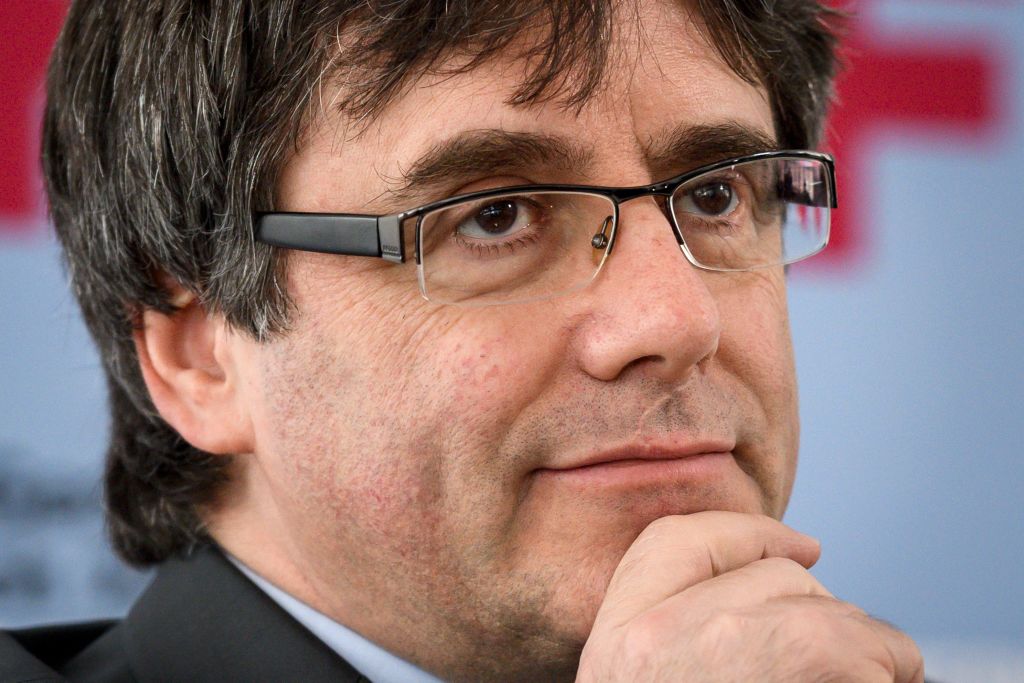Remember the Catalonia issue? Up until a couple of days ago, you would have been forgiven for supposing it had all just magically been cleared up. But on Sunday, former pro-independence Catalan president Carles Puigdemont was detained by German police while on his way back from Finland to Belgium, where he has been in voluntary exile since last October.
German courts now have a couple of months to decide whether to return the secessionists’ poster-boy to his home country; if they do, he faces charges of rebellion and misuse of public funds in connection with the Catalan independence referendum he organised last October – a vote that was declared illegal by Spain’s highest court. The charge of rebellion carries a potential prison sentence of thirty years.
Reiterating Berlin’s faith in Spanish justice, Angela Merkel’s spokesman stated on Monday that “Spain is a democracy where the rule of law exists”. This is theoretically true. But where Catalonia is concerned, Spanish justice appears inconsistent and improvised: indeed, you sense that the Spanish courts and government are using Puigdemont to send a message to Catalan secessionists – something they failed to do in the case of Artur Mas.
Mas was Puigdemont’s predecessor as Catalan president, a position he held from 2010 to 2016. He was also in favour of secession from Spain and, in November 2014, he held an independence referendum in the wealthy north-easterly region. Over 80 per cent voted to split from Spain but turnout was low, with 2.3 million out of 5.4 million eligible voters participating.
A few days before the 2014 referendum was held, Spain’s constitutional court ruled the vote illegal (sound familiar?). Mas ignored the ruling and the poll went ahead anyway. Spain’s attorney general subsequently charged its orchestrator with misuse of public funds, perverting the course of justice and abuse of power; but so far, Mas has avoided prison.
Just over a year ago, he was barred from public office for two years and fined 36,500 euros (32,000 pounds) for disobeying the constitutional court. It was nothing more than a slap on the wrist when compared with how his successor is being punished. Rajoy was prepared to let the 2014 referendum go, it seems; but last October, he thought ‘Right, enough is enough’.
Puigdemont’s immediate fate hinges on legal issues that are currently beyond Spain’s control. In particular, there is uncertainty over whether he can be extradited back to Spain on the charge of rebellion, because such an offence doesn’t exist in Germany.
The crime of high treason, however, does exist under German law; so, over the next 60 days, the German courts will decide whether Puigdemont can be extradited under this charge, which requires the subject to commit or threaten violence. If they decide that he can’t, the ex-president can only be returned to Spain under the less serious charge of misuse of public funds.
Puigdemont’s arrest has inflamed the radicalism of Catalan secessionists, for whom the former journalist is now a martyr. The region’s pro-independence parties have called a parliamentary session for tomorrow in which they will once again suggest that Puigdemont should serve as president. How exactly he could do so remains unclear.
Meanwhile, Catalonia is under the control of the central government in Madrid – as it has been since last October – because Catalan parties can’t form a government. If they haven’t done so by the end of May, Catalonian elections will be held in July, for the fifth time in seven years. As Germany decides what to do with Puigdemont, then, we’re left with the prospect of a repeat performance of everything that has happened since October, only starring different actors. You wonder which Catalan secessionist will be sitting in a foreign prison cell this time next year.






Comments